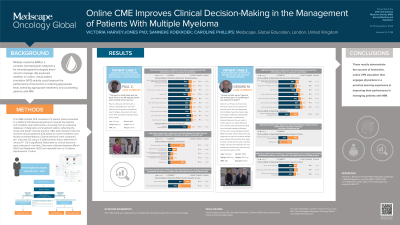Treatment of Newly Diagnosed Myeloma - Transplant Eligible
Poster Session 1
P-138: Online CME improves clinical decision-making in the management of patients with multiple myeloma
Wednesday, September 27, 2023
1:30 PM - 2:30 PM EEST


Victoria Harvey-Jones, PhD
Clinical Strategist
WebMD/Medscape Oncology Global, United States
Introduction: Multiple myeloma (MM) is a complex hematological malignancy for hematologists/oncologists (hem/oncs) to manage. We assessed whether an online, virtual patient simulation (VPS) activity could improve the performance of hem/oncs in ordering appropriate tests, selecting appropriate treatment, and counselling patients with MM.
Methods: This CME-certified VPS consisted of 2 patient cases presented in a platform that allowed physicians to assess the patients and complete open-field entries, choosing from an extensive database of diagnostic and treatment options reflecting the scope and depth of actual practice. After each decision, learners received clinical guidance (CG) based on current evidence and faculty recommendations. Clinical decisions were compared pre- and post-CG using a 2-tailed paired t-test to determine P values (P <.05 is significant). Rationales for clinical decisions were collected in real time. Data were collected between March 2022 and September 2022 and reported here as % relative improvement, P value.
Results: Case 1 (n=335 hem/oncs)
62-yr-old man with a history of hypertension referred due to fatigue, back pain with pain score 5/10, and abnormal laboratory tests. Significant changes observed for:
• Ordering appropriate tests to evaluate the patient (SPEP/SIFE, 13%, P<.001; serum LDH, 12%, P<.01, serum FLC assay, 9%, P<.01; PET-CT, 14%, P<.01; FBC, 8%, P<.01; FISH analysis, 8%, P<.01; CrCl, 14%, P<.01; chemistry panel, 7%, P<.01; bone marrow aspirate, 7%, P<.01, beta-2 microglobulin, 7%, P<.01; diagnosis of MM, 13%, P<.001)
• Selecting an appropriate treatment strategy for newly diagnosed MM (morphine sulfate slow release, 57%, P<.001; VRd, 19%, P<.001; daraVTd IV, 15%, P<.001; daraVTd sub-cut, 12%, P<.01; zoledronic acid, 60%, P<.001)
• Counselling patients regarding potential outcomes and treatment-related adverse events (TrAEs) (order patient education, 25%, P<.01; order AE monitoring, 26%, P<.001)
Case 2 (n=335 hem/oncs)
75-yr-old man with a history of type 2 diabetes, atrial fibrillation, hypertension, and MM. Routine lab work 2 weeks ago returned abnormal; patient asked to come in to discuss the results.
Significant changes observed for:
• Ordering appropriate tests to evaluate the patient (SPEP/SIFE, 13%, P<.01; serum FLC assay, 10%, P<.05; PET-CT, 17%, P<.01; FBC, 8%, P<.05; FISH analysis, 10%, P<.05; chemistry panel, 9%, P<.05; bone marrow aspirate, 11%, P<.05; diagnosis of relapsed/refractory (R/R) MM, 34%, P<.001)
• Selecting an appropriate treatment strategy for R/R MM (PomVd, 43%, P<.001; zoledronic acid, 51%, P<.001)
• Counselling patients regarding potential outcomes and TrAEs (order patient education, 14%, P<.01; order AE monitoring, 15%, P<.01; at home blood sugar monitoring, 10%, P<.05)
Conclusions: These results demonstrate the success of immersive, online VPS education that engages physicians in a practical learning experience in improving their performance in managing patients with MM.
Methods: This CME-certified VPS consisted of 2 patient cases presented in a platform that allowed physicians to assess the patients and complete open-field entries, choosing from an extensive database of diagnostic and treatment options reflecting the scope and depth of actual practice. After each decision, learners received clinical guidance (CG) based on current evidence and faculty recommendations. Clinical decisions were compared pre- and post-CG using a 2-tailed paired t-test to determine P values (P <.05 is significant). Rationales for clinical decisions were collected in real time. Data were collected between March 2022 and September 2022 and reported here as % relative improvement, P value.
Results: Case 1 (n=335 hem/oncs)
62-yr-old man with a history of hypertension referred due to fatigue, back pain with pain score 5/10, and abnormal laboratory tests. Significant changes observed for:
• Ordering appropriate tests to evaluate the patient (SPEP/SIFE, 13%, P<.001; serum LDH, 12%, P<.01, serum FLC assay, 9%, P<.01; PET-CT, 14%, P<.01; FBC, 8%, P<.01; FISH analysis, 8%, P<.01; CrCl, 14%, P<.01; chemistry panel, 7%, P<.01; bone marrow aspirate, 7%, P<.01, beta-2 microglobulin, 7%, P<.01; diagnosis of MM, 13%, P<.001)
• Selecting an appropriate treatment strategy for newly diagnosed MM (morphine sulfate slow release, 57%, P<.001; VRd, 19%, P<.001; daraVTd IV, 15%, P<.001; daraVTd sub-cut, 12%, P<.01; zoledronic acid, 60%, P<.001)
• Counselling patients regarding potential outcomes and treatment-related adverse events (TrAEs) (order patient education, 25%, P<.01; order AE monitoring, 26%, P<.001)
Case 2 (n=335 hem/oncs)
75-yr-old man with a history of type 2 diabetes, atrial fibrillation, hypertension, and MM. Routine lab work 2 weeks ago returned abnormal; patient asked to come in to discuss the results.
Significant changes observed for:
• Ordering appropriate tests to evaluate the patient (SPEP/SIFE, 13%, P<.01; serum FLC assay, 10%, P<.05; PET-CT, 17%, P<.01; FBC, 8%, P<.05; FISH analysis, 10%, P<.05; chemistry panel, 9%, P<.05; bone marrow aspirate, 11%, P<.05; diagnosis of relapsed/refractory (R/R) MM, 34%, P<.001)
• Selecting an appropriate treatment strategy for R/R MM (PomVd, 43%, P<.001; zoledronic acid, 51%, P<.001)
• Counselling patients regarding potential outcomes and TrAEs (order patient education, 14%, P<.01; order AE monitoring, 15%, P<.01; at home blood sugar monitoring, 10%, P<.05)
Conclusions: These results demonstrate the success of immersive, online VPS education that engages physicians in a practical learning experience in improving their performance in managing patients with MM.
